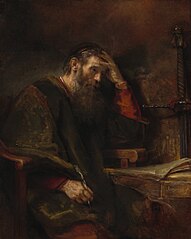The sum which two married people owe to one another defies calculation. It is an infinite debt, which can only be discharged through all eternity.
Johann Wolfgang von Goethe
In February 1973, an article called “Strengthening the Patriarchal Order in the Home,” appeared in the Ensign, the flagship publication of the Mormon Church.[1] The author, Brent Barlow, expressed deep concerns about certain disturbing trends in family governance. Most troubling was the transition “from a patriarchal to a democratic or even matriarchal type of family organization.” Further, this shift from an authoritarian to an equalitarian family structure coincided with an increase in the number of wives and mothers entering the work force. This, Barlow said, can place added stress on family relationships.[2]
Barlow blamed these developments on society’s departure from biblical teachings.[3] We should heed the counsel of the Apostle Paul, he said: “the husband is the head of the wife,”[4] and wives should submit to their husbands.[5] In defending the patriarchal order in the home, he placed special emphasis on the Lord’s words to Eve immediately prior to her expulsion from Eden: “I will greatly multiply thy pain and thy travail; in pain thou shalt bring forth children; and thy desire shall be to thy husband, and he shall rule over thee.”[6]
Forty years later, another article on the subject of marriage and family governance appeared in the Ensign: “Equal Partnership in Marriage.” [7] This piece, penned by two college professors, Valerie M. Hudson and Richard B. Miller, offers a radically different interpretation of the scriptures referenced by Barlow.
While acknowledging that Genesis does say that Adam is to “rule over” Eve,[8] the authors assert that this does not make Adam a dictator. “Over in ‘rule over’ uses the Hebrew [word] bet, which means ruling ‘with,’ not ruling ‘over,’” they claimed. Further, according to Hudson and Miller, the concept of interdependent, equal partners is well grounded in the scriptures: “Eve was Adam’s ‘help meet.’[9] The original Hebrew [word] for meet means that Eve was adequate for, or equal to, Adam. She wasn’t his servant or his subordinate.”[10]
Both articles cite reports and studies to support their version of an ideal marriage. And each attempt to silence all debate by resorting to the most common sophism—dare I say, the most popular sophism—in the church: the authority fallacy:[11] “multiple church leaders have said this is how marriage is supposed to work; ergo, it is an eternal truth.”
So, which interpretation of these ancient texts is correct? Neither, in my opinion. Both misconstrue the scriptures they cite because, like all fundamentalists (i.e., scriptural literalists), they fail to read these passages in their proper cultural and historical context. In addition, they are “proof-texting” these texts, bending them in service of an argument.
* * * * * * * * * * * * * * * * * *


At the time he penned his letter to the Ephesians, Paul was a prisoner in Rome, a city with strict “household codes” regarding families and the finite role of women (Exhibit A: Caesar’s wife). Failure to embrace the patriarchal culture of Paul’s “hosts” could adversely impact his upcoming trial.[12]
But Paul is sneaky. He calls upon all believers to submit to one another[13]—an admonition Barlow fails to mention. Further, Paul does not tell the paterfamilias how to govern his spouse, nor does he spell out the duties associated with submission. Indeed, the he simply instructs wives to respect their husbands[14]—a far cry from the wholesale submission required of women by the Roman household codes.[15]


Barlow, along with Hudson and Marlow, misconstrue Genesis 3:16, albeit in different ways. Most Christian faiths, including Mormonism, believe this scripture levies three punishments on Eve. But only the first—Eve’s suffering, especially in childbirth—is prescribed by God. The other two—being subject to her husband’s desire and his control—are merely descriptive of the hierarchal and patriarchal society she is about to inhabit.[16] Her sociological circumstances are not of God’s making; rather, the Lord is simply describing the patriarchal world she is about to enter as the result of her transgression.[17]
Further, there is no logical or textual basis for construing the Lord’s message to Eve—you will be subject to your husband’s desire and control—as applying to all women. Indeed, such a reading flies in the face of one of Mormonism’s core tenets: “We believe that men[18] will be punished for their own sins, and not for Adam’s transgression.”[19] In other words, even if one of the punishments meted out to Eve by God is being placed under the thumb of Adam, no other woman would be punished unless she similarly defied the Lord.
As to Hudson and Miller’s argument that the Hebrew word bet means ruling “with,” not ruling “over,” it does not hold up under close scrutiny. The relevant phrase in Hebrew is “w-meshal-be-t,” which the vast majority of translators render as “and he shall rule over thee.”[20] While the preposition be-t (the feminine of be) has several meanings—including, “over,” “regulate in,”[21] “above,” “among,” “against” and “with”—it makes no sense, in the context of this verse, to claim that “with” was the author’s intended meaning. God is not saying to Eve, “As a reward for disobeying my instructions, I am giving you an equal say in how things will be done.”[22]
* * * * * * * * * * * * * * * * * *
Though the Bible offers little or no support for the positions advanced by these authors, there is still the question of whether either of the blueprints for marriage they advance is laudable, or is there a third option superior to both of these? Unfortunately, answering this question is nigh impossible since there has never been a universal understanding of what comprises an ideal marriage.
Cultural, political and economic circumstances can have a profound impact on family structures and relationships. For example, in an agrarian economy, men are required to perform the most onerous physical tasks, while the family looks to the wife and mother to both manage the household and produce children to work the fields.
In many cultures, marriage is a commercial transaction where the groom purchases a wife (the “bride price”). In others, the consideration takes the form of a dowry used by the bride’s family to buy their daughter a husband.[23]

Romance, affection and love—relatively modern considerations—frequently were not part of the equation. This was especially true for arranged marriages between members of royal families, the sole object of which was to maintain a firm grip on political power and form alliances with other nations. Over time, however, such inbreeding caused genetic disorders, impairing both the physical and mental health of the monarch, e.g., Charles II of Spain.[24]
Some Scandinavian countries have experimented with “trial marriages,” releasing husbands from their marital vows should the wife fail to become pregnant. And, of course, there is the Old Testament practice of polygamy, which Mormons resurrected in the 19th century but abandoned in the early years of the twentieth.[25] Lastly, several of the Iroquois tribes I have represented during my legal career are both matriarchal and matrilineal: women pick the tribal leaders[26] and tribal membership is determined exclusively through the mother’s bloodline.[27]
In the words of Richard Posner, “marriage has changed greatly in history, and it would be foolish to think that the current marriage conventions will remain fixed for all time.”[28] While I concur with Posner’s view, I still believe we can profit from thinking about family governance and the ideal power dynamic between a husband and wife.
* * * * * * * * * * * * * * * * * *
Obviously, many marital problems can be averted if the couple, prior to taking their vows, reach a consensus on certain big questions, e.g., the number children they will have, the religious tradition that will prevail in the home, etc. Also, some churches—most notably, the Catholic Church—offer marriage preparation classes, counseling and conferences for engaged couples. This is a wonderful idea.
Nevertheless, it is impossible to anticipate all major issues where a husband and wife may struggle to reach a consensus. For those situations, I would like to propose a framework for resolving disagreements, a paradigm based on my reading of a C. S. Lewis novel and reexamination of the Genesis creation story.


In 1945, Lewis published The Hideous Strength,[29] the third volume of his theological science fiction Space Trilogy—what he called, “A Modern Fairy Tale for Grown-Ups.” This is a classic tale of good vs. evil with strong biblical overtones. Among other things, it wrestles with questions about the nature of man and his desire for power.
The setting for the story is rural England around 1948. Mark and Jane Studdock, two progressive English academics leading unremarkable lives are the central characters.
One day, a mysterious company called the National Institute of Co-ordinated Experiments (“N.I.C.E.”) takes up residence in their community. Notwithstanding its benign acronym, N.I.C.E.’s undisclosed objective is to gain control of the government and social structures of England as a prelude to acquiring total power over the entire world. (This theme was also explored in Orwell’s 1984, published four years later.)
Mark, who believes in the progressive ideal of science, is recruited by N.I.C.E. with promises of wealth and exciting research opportunities. But his wife, Jane, warned by recurring dreams and visions of N.I.C.E.’s true purpose, takes a different path. She makes common cause with a small group of insurgents led by Elwin Ransom, who is living with his followers in a manor house nearby. Their collective mission is to thwart N.I.C.E.’s evil designs.
Ransom—who was the protagonist in the first two volumes of the Space Trilogy—possesses certain angelic qualities. He no longer appears to be aging, and he communes regularly with heavenly messengers.[30] But he is not infallible. He, along with his ragtag group of disciples, are left to their own devices when it comes to finding the best way to thwart the aims of N.I.C.E. And they sometimes make mistakes.
Jane’s request for admittance to Ransom’s band of crusaders is initially declined; instead, she is instructed to return to her husband with the goal of trying to detach him from N.I.C.E. But Jane demurs, saying “What have I to say to him? He’d think it all nonsense. [Besides,] Mark never takes any notice of what I say.” In reality, she and Mark thought this of each other.[31]
Ransom then asked, “Do you not want to save him as well as yourself?” But Jane ignored his question and asked one of her own: “You don’t think a woman is to have no life of her own just because she’s married?” She then declared, “I don’t think I look on marriage quite as you do. It seems extraordinary that everything should hang on what Mark says … about something he doesn’t understand.”[32]
“Child,” said Ransom, “it is not a question of how you or I look on marriage but how my Masters look on it.”
“And would it make no difference to them what a marriage was actually like—whether it was a success? Whether the woman loved her husband?” Realizing how pathetic she sounded and how unfair she was being to Mark, she quietly said, “It was not his fault. I suppose our marriage was just a mistake.” But after a moment, she asked, “What would you—what would the people you are talking of—say about a case like that?”[33]
Ransom replied, “They would say that you do not fail in obedience through lack of love, but have lost love because you never attempted obedience.”
“I thought love meant equality,” she said, … that in their souls people are equal?” Ransom acknowledges the importance of equal treatment under the law, but declares that neither in our souls or in our marriage are we equal. And then adds, “It’s not your fault. They never warned you. No one has ever told you that obedience—humility—is an erotic necessity. You are putting equality where it ought not to be.” After a brief pause, he attempted to lighten the mood by illustrating the whimsical side of obedience.[34]
He took from his pocket a whistle and proceeded to blow a note. Shortly thereafter, three mice appeared from behind a coal box and came to the foot of Ransom’s desk. He proceeded to drop some crumbs onto the floor from some bread he had eaten for lunch, which the mice voraciously devoured. Once the last crumb had been consumed, Ransom played a second note on his whistle, whereupon the mice dutifully return to their home.[35]
“There,” he said, “a very simple adjustment. Humans want crumbs removed; mice are anxious to remove them. It ought never to have been a cause of war. But you see that obedience and rule are more like a dance than a drill—specially between a man and woman where the roles are always changing.”[36] (Emphasis added.)
In other words, the husband may lead when it comes to certain matters; as to other concerns, however, he should accept and follow his wife’s counsel. Ideally, the decision will be made by the person with most experience and expertise, supplemented by input from the other party. Support for this approach, I believe, can be found in Lewis’s belief in the inequality of souls.
“Inequality” in this sense means “different,” not “superior.” Men and women are neither physiologically nor neurologically the same. Their brains, for example, function differently, affecting their thought processes, behavior, emotions and how they see the world and its inhabitants.[37]
Jehovah illustrated this difference when he concluded that Adam would profit from having a “help meet.” This phrase, as noted by the biblical scholar Robert Alter, is devilishly hard to translate. In Hebrew it literally means “opposite him” or “a counterpart to him.” Elsewhere in the Old Testament it connotes “active intervention on behalf of someone”(such as, “Dear, why don’t we stop and ask for directions and rest our camels?”).[38] Ascribing these attributes to Eve also finds support in the manner by which she comes into existence.

When God took a rib from Adam’s side to create Eve, Adam lost something more than just a bone. Rather, he lost a portion of his very being, of his soul if you will. While his loss redounded to Eve’s benefit, he still retained certain qualities (e.g., greater physical strength) denied to Eve. The result, if man and woman are able to embrace these differences, is a co-dependency. This, I believe, is why the verse immediately following Eve’s creation contains the following injunction: “Therefore a man shall leave his father and his mother and hold fast to his wife, and they shall become one flesh.”
This passage refers to much more than the act of procreation. Rather, it represents the metaphorical return to Adam of his rib and the couple’s merging of their physical, intellectual and emotional resources. In this manner, the sum of parts becomes greater than the whole.
None of this, of course, guarantees harmony in the home. But with this understanding, perhaps each spouse can learn when to yield to the superior knowledge and wisdom of their partner on a given question, and accept their role as a follower, not the leader.
Now, if all of this sounds a bit overwhelming to those who are in search of a mate, then you should do what I did: marry someone with low expectations. Then everything will be just fine.
[1] Barlow, Brent, “Strengthening the Patriarchal Order in the Home,” The Ensign (Feb. 1973) p. 29. The Ensign was first published in 1971. At the end of 2020, the Church of Jesus Christ of Latter-day Saints elected to discontinue publication of this magazine, which it replaced the Liahona.
[2] Ibid, pp. 29-30.
[3] Ibid, p. 30.
[4] Eph. 5:23.
[5] Eph. 5:22; see also Col. 3:18.
[6] Judith Klitsner, Subversive Sequels in the Bible: How Biblical Stories Mine and Undermine Each Other, (New Milford, Connecticut: Maggid Books, 2011), pp. 107-108.
[7] Hudson, Valerie M. and Miller, Richard B., “Equal Partnership in Marriage,” The Ensign (April 2013), p. 19.
[8] Genesis 3:16.
[9] Ibid.
[10] For a more complete comparison of these two articles from The Ensign, see “Truth for Our Times,” by M. Miles on By Common Consent Blog, last accessed on March 10, 2024: http://bycommonconsent.com/2013/03/21/truth-for-our-times/#more-42842
[11] This fallacy is present when someone uses the opinion of an authority or expert as evidence to support an argument, i.e., blindly accepting their views simply by reason of who they are. But an opinion, regardless of its source, never constitutes evidence. Falling into this trap is precisely what Hugh B. Brown, a former member of the First Presidency of the Mormon Church, cautioned against when he said: “[T]here are altogether too many people in the world who are willing to accept as true whatever is printed in a book or delivered from a pulpit. Their faith never goes below the surface soil of authority. Hugh B. Brown, Edwin B. Firmage, ed., An Abundant Life: The Memoirs of Hugh B. Brown, 2nd ed. (Salt Lake City, Utah: Signature Books, 1999), pp. 135-136.
[12] Dictionary of Paul and His Letters, Gerald F. Hawthorne, Ralph P. Martin, and Daniel G. Reid, eds., (Downers Grove, Illinois: InterVarsity Press, 1993), p. 587.
[13] Eph. 5:21 (ESV).
[14] Eph. 5:33 (NRSV).
[15] Dictionary of Paul and His Letters, p. 588.
[16] Interpreting these descriptors as “punishments” would be highly problematical in Mormon theology since they would deprive Eve of her agency, i.e., her ability to make independent choices and decisions.
[17] The biblical scholar Robert Alter also notes the contradictions between Genesis 1 and 2, but then makes this observation: “[This discrepancy] makes perfect sense as an account of the contradictory facts of woman’s role in the post-edenic scheme of things, [given that] the writer is a member of a patriarchal society in which women have more limited legal privileges.” Robert Alter, The Art of Biblical Narrative, (New York, New York: Basic Books, 1981), pp. 145-146.
[18] Clearly, the word “men” in this instance is gender neutral, encompassing both men and women; the same also applies to “Adam.”
[19] Joseph Smith, The Pearl of Great Price, “The Articles of Faith,” v. 2.
[20] See, e.g., The Jewish Study Bible (2nd ed.), Adele Berlin and Marc Zvi Brettler, ed. (New York, New York: Oxford University Press, 2004), p. 15; Robert Alter, The Five Books of Moses: A Translation with Commentary, (New York, New York: W. W. Norton & Company, 2004), p. 26.
[21] Jeff A. Benner, A Mechanical Translation of The Book of Genesis: The Hebrew text literally translated word for word, (Virtualbookworm.com Publishing, 2007), p. 30.
[22] Hudson and Miller’s translation of the word “helpmeet” is also flawed. Most translations of Genesis 2:18 render this word as “helper” or “helper suitable for him.” None of the translations most frequently used by scholars translate helpmeet as “adequate for” or “equal to,” though some render it as “opposite him” or “a counterpart to him,” about which I say more below.
[23] Gary S. Becker and Richard A. Posner, Uncommon Sense: Economic Insights, from Marriage to Terrorism, (Chicago, Illinois: University of Chicago Press, 2009), p. 19.
[24] Giles Tremlett, España: A Brief History of Spain, (New York, New York: Bloomsbury Publishing, 2022), pp. 151-152.
[25] Uncommon Sense, p. 19.
[26] Pekka Hämäläinen, Indigenous Continent: The Epic Contest for North America, (New York, New York: Liveright Publishing Corporation, 2022), p. 99.
[27] The Cherokee, Chickasaw, Choctaw and Muscogee societies were also matrilineal. Ibid, p. 197.
[28] Ibid.
[29] C. S. Lewis, The Hideous Strength, (New York, New York: Scribner, 2003).
[30] Elements of Arthurian legends permeate The Hideous Strength. “Elwin” is a derivative of Ælfwine or “Elf-Friend, suggesting that Elwin Ransom is descended from King Arthur, who in turn was part of a long line of Elf-Friends. The sacrifices Ransom makes on behalf of mankind and at direction of his Masters naturally invoke thoughts of the Savior.
[31] The Hideous Strength, p. 143.
[32] Ibid, pp. 143-144.
[33] Ibid, pp. 144-145.
[34] Ibid, pp. 145-146.
[35] Ibid, pp. 146-147.
[36] Ibid, p. 147.
[37] Sarah Knapton, “Men and women’s brains do work differently,” (The Telegraph, February 19, 2024), last accessed on March 10, 2024: https://www.telegraph.co.uk/news/2024/02/19/men-women-brains-work-differently-scientists-discover/
[38] The Five Books of Moses, supra, p. 22. See also A Mechanical Translation, supra, p. 25.
